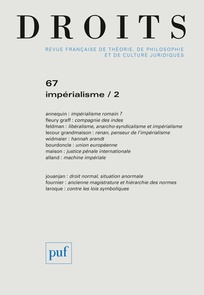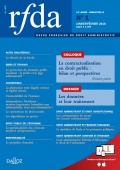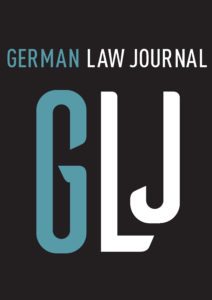Sep. 8, 2019

Après
Justifier l’injustifiable (PUF, 2017), la réflexion sur le « droit » des espaces concentrationnaires constitue la suite indispensable à la construction de l’image globale du « droit » nazi.
Le « droit » des camps ne peut être pensé sans que l’on reconnaisse au préalable la qualité d’« étranger à la communauté ». La conséquence de la reconnaissance de la qualité juridique d’« étranger à la communauté » s’impose : tout « étranger à la communauté » pourra être placé d’office, par mesure de police, en centre de rétention ou de réhabilitation. L’Allemagne nazie, écrit l’auteur, « n’est plus qu’un immense camp de concentration virtuel qui, à chaque instant, devient réel pour celui que son comportement ou sa simple décision d’esprit désignent comme ‘étranger à la communauté’ ».
Les camps de concentration apparaissent dès 1933. Les décisions de rétention de protection (
Schutzhaft), d’ordre administratif, prises par l’autorité policière étaient discrétionnaires, arbitraires même, et ne faisaient l’objet d’aucun contrôle juridictionnel. La rétention de protection pouvait être prononcée par la Gestapo à l’encontre d’un individu en dehors de toute action pénale et sans qu’un juge intervienne dans la procédure, ou bien à l’encontre d’un inculpé pour lequel le juge n’a prononcé aucune mesure de « détention préventive », ou encore à l’encontre qui, passé en jugement, a bénéficié d’une décision de relaxe et d’acquittement, à l’encontre enfin d’un condamné qui a purgé sa peine d’emprisonnement. La détention de prévention s’est ainsi transformée en une sorte de « correction » des décisions judiciaires. L’autorité de la chose jugée n’avait aucune valeur pour la police de la SS. La compétence illimitée de la Gestapo de décider d’interner un individu dans un camp de concentration s’inscrivait dans le cadre normatif nazi tout en n’étant soumise à aucune procédure particulière. « L’interné d’un camp était-il […] dans le droit ou en son dehors ? »
La compétence aux contours illimités signifiait pour l’individu « un indéfinissable du droit ». Mais être « étranger à la communauté », c’est ne pas être dans l’ordre éthique de la communauté, c’est ne pas être dans l’ordre concret de cette communauté, il était hors du droit. Le camp de concentration est le « destin » de ce « hors-la-loi », ces espaces apparaissent comme « l’ordre normal de l’individu anormal ». Les espaces concentrationnaires sont « complément logique » du droit nazi, ils sont « la vraie frontière de la communauté populaire ». Le « droit » des camps n’était que l’arbitraire et la violence déguisés. Le mot « droit » n’était plus que le signe linguistique de la violence. L’« inversion sémantique » désignait le droit des camps et le droit nazi tout entier qui n’est rien d’autre qu’une « comédie de droit ». La dichotomie qui existait entre l’auto-administration juive et le droit « de ceux qui détenaient la puissance » s’imposant à tout le Ghetto n’était que fiction, car l’auto-administration ne représentait qu’un « pouvoir concédé par la SS » qui disposait d’une compétence souveraine en dehors et à l’intérieur de ces espaces où toute règle faisait immanquablement partie de cette « farce juridique ». Le droit du camp n’est en aucun cas un « minimum éthique ». Il était au contraire une mécanique détruisant la possibilité même d’une vie éthique minimale en faisant vivre les détenus « hors de toute norme ». La « normalité fantasmée » ne peut dès lors être qualifiée de « normativité » juridique.
Juli 16, 2019
 Résumé :
Résumé :
Les auteurs ont participé à un dossier détaillé sur la responsabilité du fait des lois inconstitutionnelles ou inconventionnelles dans plusieurs pays européens en apportant une introduction au droit de la responsabilité de l'État d'un point de vue allemand. Ils démontrent qu'en principe une telle responsabilité est possible en droit allemand, mais elle est de fait tellement encadrée par des conditions strictes que cela conduit en pratique à une non-responsabilité. C'est donc au législateur de créer un régime de responsabilité effectif - ce qui n'a pas encore été fait sur le plan fédéral.
Juli 4, 2019
Données bibliographiques / Bibliografische Daten |
|---|
| Auteurs / Autoren: | ULRICH, JACOB; KESSEN, JAN |
|---|
| Source / Fundstelle: | https://www.cambridge.org/core/journals/german-law-journal/article/constitutionstheir-role-through-the-ages-notes-on-the-59th-meeting-of-germanspeaking-public-law-assistants-in-frankfurt-am-main/2536CF87A2C61ABEE23B2AFCE2E7190A |
|---|
| Revue / Zeitschrift: | German Law Journal |
|---|
| Localisation / Standort: | German Law Journal, Volume 20, Issue 5, pp. 748-754 |
|---|
| Catégorie / Kategorie: | Droit constitutionnel |
|---|
| Mots clef / Schlagworte: | Grundgesetz, Droit constitutionnel allemand |
|---|
 Abstract:
Abstract:
Once a year, the German-speaking public law assistants meet to discuss recent developments in their working areas. This year, the anniversary of several enactments of constitutions, such as the Grundgesetz, suggested to discuss issues with regard to the role of constitutions for the democratic state, constitutional change, and the relevance of constitutions for societal cohabitation. During the lively discussions, one could observe a trend towards interdisciplinary research in the work of young public law scholars.
Juni 24, 2019
Données bibliographiques / Bibliografische Daten |
|---|
| Auteurs / Autoren: | HUBERT, JULIANE; GÖRLITZ, FRANZISKA; KUCHER, JASMIN; SCHEFFER, MORITZ; WIESER, PATRICK |
|---|
| Source / Fundstelle: | https://www.cambridge.org/core/journals/german-law-journal/article/tatprovokation-the-legal-issue-of-entrapment-in-germany-and-possible-solutions/964310727F53984D02FB1BB6031289E3 |
|---|
| Revue / Zeitschrift: | German Law Journal |
|---|
| Année / Jahr: | 2019 |
|---|
| Localisation / Standort: | German Law Journal, Volume 20, Issue 4, pp. 496-509 |
|---|
| Catégorie / Kategorie: | Droit pénal, Strafrecht |
|---|
| Mots clef / Schlagworte: | Tatprovokation, Provocation à l'infraction, Provocation à la preuve |
|---|
 Abstract:
Abstract:
Incitement by police officers is a well-known and often utilized police measure in the German investigation process. Yet, when it comes to prosecuting the perpetrators, a moral conflict arises. Should a State, bound by its own constitution and committed to protect its citizens, be allowed to incite or support a possible offender and afterwards judge on his or her wrongful actions? After Germany’s higher courts had to deal with multiple cases of entrapped perpetrators, there has been a strong debate about the admissibility, requirements, and consequences of entrapment within the German legal system. International and national courts as well as scholars represent different legal standpoints in this regard. In particular, the approaches of the European Court of Human Rights and the German Federal Court of Justice differ significantly in their results. As Germany ratified the European Convention on Human Rights and therefore has to adhere to the European Court of Human Rights’ ruling, an additional legal conflict arises. This article depicts and discusses the most relevant approaches to resolve this moral and legal conflict and satisfy both the need for effective prosecution and the procedural rights of the individual person subject to the act of entrapment. Additionally, recent legislative ambitions are presented.
März 13, 2019
 Abstract
Abstract:
People of Turkish ethnicity constitute Germany’s largest immigrant group but only a small percentage have naturalized as German citizens. This article explores the historical foundation of Turkish migration to Germany and the legislative attempts made by both Germany and Turkey to accommodate these people with one foot in each country. It argues that only by abandoning its long-held prejudice against dual citizenship can Germany increase the naturalization rate of all foreigners in its country, not just those from Turkey.

 Après Justifier l’injustifiable (PUF, 2017), la réflexion sur le « droit » des espaces concentrationnaires constitue la suite indispensable à la construction de l’image globale du « droit » nazi.
Le « droit » des camps ne peut être pensé sans que l’on reconnaisse au préalable la qualité d’« étranger à la communauté ». La conséquence de la reconnaissance de la qualité juridique d’« étranger à la communauté » s’impose : tout « étranger à la communauté » pourra être placé d’office, par mesure de police, en centre de rétention ou de réhabilitation. L’Allemagne nazie, écrit l’auteur, « n’est plus qu’un immense camp de concentration virtuel qui, à chaque instant, devient réel pour celui que son comportement ou sa simple décision d’esprit désignent comme ‘étranger à la communauté’ ».
Les camps de concentration apparaissent dès 1933. Les décisions de rétention de protection (Schutzhaft), d’ordre administratif, prises par l’autorité policière étaient discrétionnaires, arbitraires même, et ne faisaient l’objet d’aucun contrôle juridictionnel. La rétention de protection pouvait être prononcée par la Gestapo à l’encontre d’un individu en dehors de toute action pénale et sans qu’un juge intervienne dans la procédure, ou bien à l’encontre d’un inculpé pour lequel le juge n’a prononcé aucune mesure de « détention préventive », ou encore à l’encontre qui, passé en jugement, a bénéficié d’une décision de relaxe et d’acquittement, à l’encontre enfin d’un condamné qui a purgé sa peine d’emprisonnement. La détention de prévention s’est ainsi transformée en une sorte de « correction » des décisions judiciaires. L’autorité de la chose jugée n’avait aucune valeur pour la police de la SS. La compétence illimitée de la Gestapo de décider d’interner un individu dans un camp de concentration s’inscrivait dans le cadre normatif nazi tout en n’étant soumise à aucune procédure particulière. « L’interné d’un camp était-il […] dans le droit ou en son dehors ? »
La compétence aux contours illimités signifiait pour l’individu « un indéfinissable du droit ». Mais être « étranger à la communauté », c’est ne pas être dans l’ordre éthique de la communauté, c’est ne pas être dans l’ordre concret de cette communauté, il était hors du droit. Le camp de concentration est le « destin » de ce « hors-la-loi », ces espaces apparaissent comme « l’ordre normal de l’individu anormal ». Les espaces concentrationnaires sont « complément logique » du droit nazi, ils sont « la vraie frontière de la communauté populaire ». Le « droit » des camps n’était que l’arbitraire et la violence déguisés. Le mot « droit » n’était plus que le signe linguistique de la violence. L’« inversion sémantique » désignait le droit des camps et le droit nazi tout entier qui n’est rien d’autre qu’une « comédie de droit ». La dichotomie qui existait entre l’auto-administration juive et le droit « de ceux qui détenaient la puissance » s’imposant à tout le Ghetto n’était que fiction, car l’auto-administration ne représentait qu’un « pouvoir concédé par la SS » qui disposait d’une compétence souveraine en dehors et à l’intérieur de ces espaces où toute règle faisait immanquablement partie de cette « farce juridique ». Le droit du camp n’est en aucun cas un « minimum éthique ». Il était au contraire une mécanique détruisant la possibilité même d’une vie éthique minimale en faisant vivre les détenus « hors de toute norme ». La « normalité fantasmée » ne peut dès lors être qualifiée de « normativité » juridique.
Après Justifier l’injustifiable (PUF, 2017), la réflexion sur le « droit » des espaces concentrationnaires constitue la suite indispensable à la construction de l’image globale du « droit » nazi.
Le « droit » des camps ne peut être pensé sans que l’on reconnaisse au préalable la qualité d’« étranger à la communauté ». La conséquence de la reconnaissance de la qualité juridique d’« étranger à la communauté » s’impose : tout « étranger à la communauté » pourra être placé d’office, par mesure de police, en centre de rétention ou de réhabilitation. L’Allemagne nazie, écrit l’auteur, « n’est plus qu’un immense camp de concentration virtuel qui, à chaque instant, devient réel pour celui que son comportement ou sa simple décision d’esprit désignent comme ‘étranger à la communauté’ ».
Les camps de concentration apparaissent dès 1933. Les décisions de rétention de protection (Schutzhaft), d’ordre administratif, prises par l’autorité policière étaient discrétionnaires, arbitraires même, et ne faisaient l’objet d’aucun contrôle juridictionnel. La rétention de protection pouvait être prononcée par la Gestapo à l’encontre d’un individu en dehors de toute action pénale et sans qu’un juge intervienne dans la procédure, ou bien à l’encontre d’un inculpé pour lequel le juge n’a prononcé aucune mesure de « détention préventive », ou encore à l’encontre qui, passé en jugement, a bénéficié d’une décision de relaxe et d’acquittement, à l’encontre enfin d’un condamné qui a purgé sa peine d’emprisonnement. La détention de prévention s’est ainsi transformée en une sorte de « correction » des décisions judiciaires. L’autorité de la chose jugée n’avait aucune valeur pour la police de la SS. La compétence illimitée de la Gestapo de décider d’interner un individu dans un camp de concentration s’inscrivait dans le cadre normatif nazi tout en n’étant soumise à aucune procédure particulière. « L’interné d’un camp était-il […] dans le droit ou en son dehors ? »
La compétence aux contours illimités signifiait pour l’individu « un indéfinissable du droit ». Mais être « étranger à la communauté », c’est ne pas être dans l’ordre éthique de la communauté, c’est ne pas être dans l’ordre concret de cette communauté, il était hors du droit. Le camp de concentration est le « destin » de ce « hors-la-loi », ces espaces apparaissent comme « l’ordre normal de l’individu anormal ». Les espaces concentrationnaires sont « complément logique » du droit nazi, ils sont « la vraie frontière de la communauté populaire ». Le « droit » des camps n’était que l’arbitraire et la violence déguisés. Le mot « droit » n’était plus que le signe linguistique de la violence. L’« inversion sémantique » désignait le droit des camps et le droit nazi tout entier qui n’est rien d’autre qu’une « comédie de droit ». La dichotomie qui existait entre l’auto-administration juive et le droit « de ceux qui détenaient la puissance » s’imposant à tout le Ghetto n’était que fiction, car l’auto-administration ne représentait qu’un « pouvoir concédé par la SS » qui disposait d’une compétence souveraine en dehors et à l’intérieur de ces espaces où toute règle faisait immanquablement partie de cette « farce juridique ». Le droit du camp n’est en aucun cas un « minimum éthique ». Il était au contraire une mécanique détruisant la possibilité même d’une vie éthique minimale en faisant vivre les détenus « hors de toute norme ». La « normalité fantasmée » ne peut dès lors être qualifiée de « normativité » juridique.



